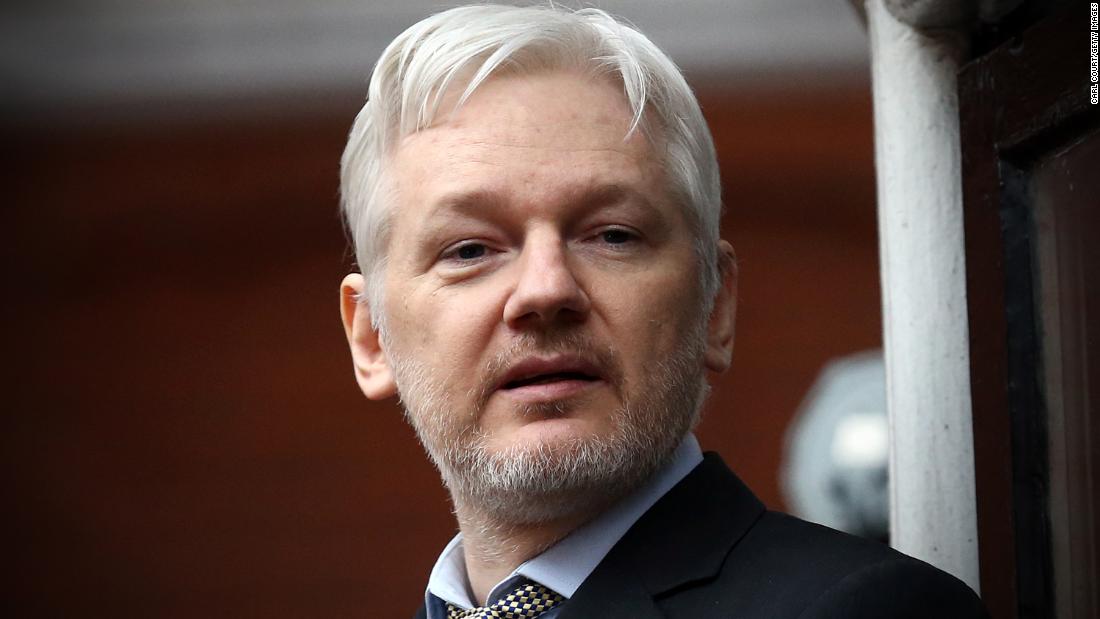This is a good news for CNN news
Video shows arrest of Assange
Julian Assange arrested in London
By Lauren Said-Moorhouse and Nick Thompson, CNN
Updated 5 min ago12:38 p.m. ET, April 11, 2019
Ecuador's ex-President says the country's abandonment of Assange is "the biggest betrayal in Latin American history"
Ecuador's former president Rafael Correa said the revocation of Julian Assange's asylum is "incredible," in an interview with CNN's Richard Quest today.
"It’s incredible. We cannot imagine something like this. It’s against international law; it’s against the institution of asylum; it’s against the Ecuadorian constitution, especially because since last year, Julian Assange has had Ecuadorian citizenship," Correa said.
Correa was in power when Assange requested asylum. He told CNN he agreed to shelter the Australian WikiLeaks founder "not because we agree with what he did" but because "it was very clear that he didn’t have the opportunity to have a fair lawsuit, a fair process in the US."
Correa laughed as Quest read out a list of Assange’s supposed violations as outlined by Ecuador’s President Lenin Morenoearlier Thursday.
Correa added that Moreno has never seen eye to eye with Assange since assuming the presidency in 2017.
In addition to allowing UK police to enter the Ecuadorian embassy to arrest Assange, Ecuador also announced his citizenship had been suspended effective from Wednesday, according to foreign minister Jose Valencia at a press conference.
How long did Assange spend in Ecuador's embassy?
File photograph of Assange peering through the balcony window of the Ecuadorian embassy in central London on February 5, 2016.
In case you're wondering WikiLeaks founder Julian Assange stayed in his self-imposed exile at Ecuador's London embassy for six years, nine months and 24 days.
Or 2,488 days from start to end.
He entered his diplomatic bolthole on June 19, 2012.
(Perfectly useless knowledge unless it crops up at a trivia night.)
Assange reacts to possible US extradition: "I told you so"
Speaking to journalists in a scrum outside Westminster Magistrates Court on Thursday afternoon, Jennifer Robinson, a member of Julian Assange's legal team, said they had been proven right in regards to their previous warnings that Assange would face extradition to United States for his "publishing activities" since 2010.
Robinson added her client was formally notified his asylum would be revoked by the Ecuadorian Ambassador this morning.
More charges expected against Assange in US hacking case
From CNN's Evan Perez
US Justice Department officials expect to bring additional charges Assange, according to a US official briefed on the matter. It is unclear when officials would bring such charges.
The years-long FBI investigation into Assange transformed in recent years with the recovery of communications that prosecutors believe shows Assange had been been a more active participant in a conspiracy to hack computers and violate US law, officials say.
The Justice Department had struggled for years with the question of whether Assange and WikiLeaks should be treated as journalists and publishers. News organizations similarly published stolen classified documents, some even worked with WikiLeaks to get access to documents and publish stories.
The view among prosecutors began changing late in the Obama administration, in part due to new evidence the FBI believed showed Assange was not entitled to journalistic protections.
In 2017, the WikiLeaks publication of stolen CIA hacking codes helped propel the case against Assange, according to current and former US law enforcement officials.
Read more below:
Assange is facing a year in jail for skipping out on bail
From CNN's Muhammad Darwish at Westminster Magistrates Court, London
WikiLeaks founder Julian Assange is now facing up to 12 months behind bars after being found guilty of breaking his bail conditions when he entered the Ecuadorian embassy in 2012.
A date has yet to be set for his sentencing at London's Southwark Crown Court.
Assange has been remanded in custody until his May 2 extradition hearing at Westminster Magistrates Court.
UK Home Secretary: Both Ecuador and the UK were increasingly concerned over Assange's health
Britain's Home Secretary Sajid Javid on April 4.
The UK's Home Secretary Sajid Javid addressed the House of Commons on Thursday afternoon for the first time since Julian Assange was removed from the Ecuadorian embassy and arrested.
Javid told members of parliament that both the UK and Ecuadorian government had "become increasingly concerned about the state of Mr. Assange's health."
The first action of London's Metropolitan Police was to have him medically assessed and deemed fit to detain, he said, adding that Assange had received access to doctors while holed up within his diplomatic shelter.
Javid then outlined how court proceedings would play out: Under UK law, following the provisional arrest, the full extradition papers must be received by the judge within 65 days. The extradition request must be certified by Home Office before going to court, Javid said.
"I am glad the situation in the Ecuadorian embassy has been brought to an end," Javid said in closing. "It is right that we implement the judicial process fairly and consistently with due respect for equality before the law."
How this media outlet landed the Assange arrest scoop
From CNN's Hadas Gold
Apart from the odd special appearance from the Ecuadorian embassy's balcony, Julian Assange hadn't been seen outside in seven years. It was a moment that global news organizations were desperate to show their audiences. In the end, the only media outlet with video of the moment was an outfit called Ruptly.
Founded in 2013, Ruptly -- which has carved out a niche for itself by recording events around the world and selling the footage to other broadcasters -- is a subsidiary of Russian state-backed media outlet RT.
Laura Lucchini, Ruptly's deputy head of news, said its staff had been recording events outside the embassy 24/7 since at least April 5.
"For the last week, we closely monitored developments on this story while our team of producers worked in shifts, filming the embassy 24/7. On many of these days and nights, there were no developments. We saw camera crews come and go. But we stayed. We believe that these images hold great news value."
According to the Guardian, after it started to seem in recent weeks that an arrest might be imminent, big UK broadcasters had formed a "pool" arrangement to take turns staking out the building. If something happened, the footage would be shared among the pool members.
That effort appeared to have been abandoned when the arrest failed to materialize. The BBC, ITN and Sky News did not immediately respond to requests for comment.
Ecuador says Assange put feces on embassy walls
From CNN's Ana Melgar and Radina Gigova in Atlanta
Ecuador’s Interior Minister María Paula Romo says Julian Assange's asylum was revoked because there was sufficient evidence that he was meddling in Ecuador's internal affairs in an effort to destabilize the government.
Romo also reiterated President Lenin Moreno's remarks that Assange was consistently violating embassy residency rules, and specifically called out how he would put feces on the walls.
"For several years now, one of the key members of the WikiLeaks organization and a person close to Assange has lived in Ecuador," Romo said at a press conference Thursday.
This member "works closely and has traveled with Ricardo Patiño to Peru, Spain and Russia."
Patiño was chancellor during the government of former president of Correa, who was in power when Assange was granted asylum.
CNN has reached out to Chancellor Patiño. Previously Patiño defended the innocence of Assange saying his fight was a "fight for freedom of expression."
Two Russian hackers are also suspected of meddling in the attempt to destabilize the government and their information will be delivered to the Office of the Attorney General of Ecuador, Romi said.
"We are not going to allow Ecuador to become a hacking center and we cannot allow illegal activities to take place in the country in order to harm citizens or other governments," Rome said. The authorities did not clarify whether these people have been detained or only identified.
The interior minister said that "in the next few hours" the government of Ecuador will provide additional evidence that justifies the decision to end Assange’s asylum.
During former President Correa's government and while Patiño was chancellor, "they tolerated things like Assange putting feces on the embassy walls and other behaviors far from the minimum respect that a guest can have," said Romo.
Here's the timeline of Assange's arrest today
From CNN's Muhammad Darwish at Westminster Magistrates Court, London
Julian Assange gives a thumbs up to onlookers from inside a police van in London on Thursday.
More details around Julian Assange's dramatic ejection from the Ecuadorian embassy are emerging.
A lawyer for the US government revealed arrest officers went to the embassy at 9.15 a.m. local time (4.15 a.m. ET), where ambassadors met them. The ambassador then revoked Assange's asylum and met with him at 10 a.m. (5 a.m. ET). The lawyer said officers tried to introduce themselves, but Assange barged past them in an attempt to return to a private room.
He was eventually arrested at 10.15 a.m. (5.15 a.m. ET) but resisted and had to restrained, leading to the dramatic scenes of British police hauling him by force out of the building.
After being lifted into the waiting police van, he was taken directly to a police station where he was formally arrested.






Comments
Post a Comment